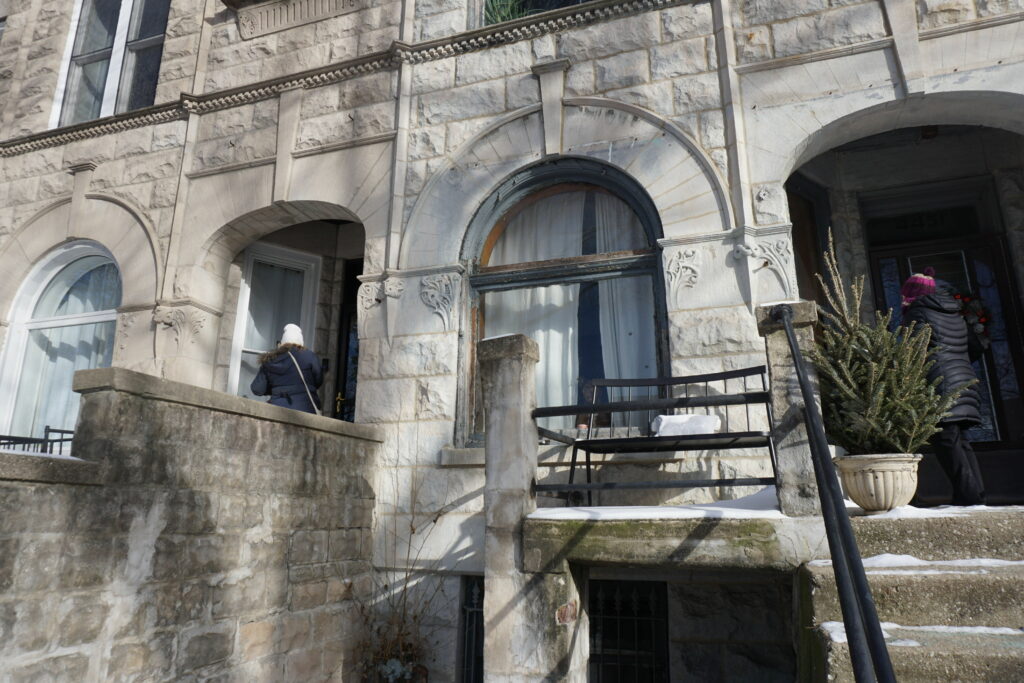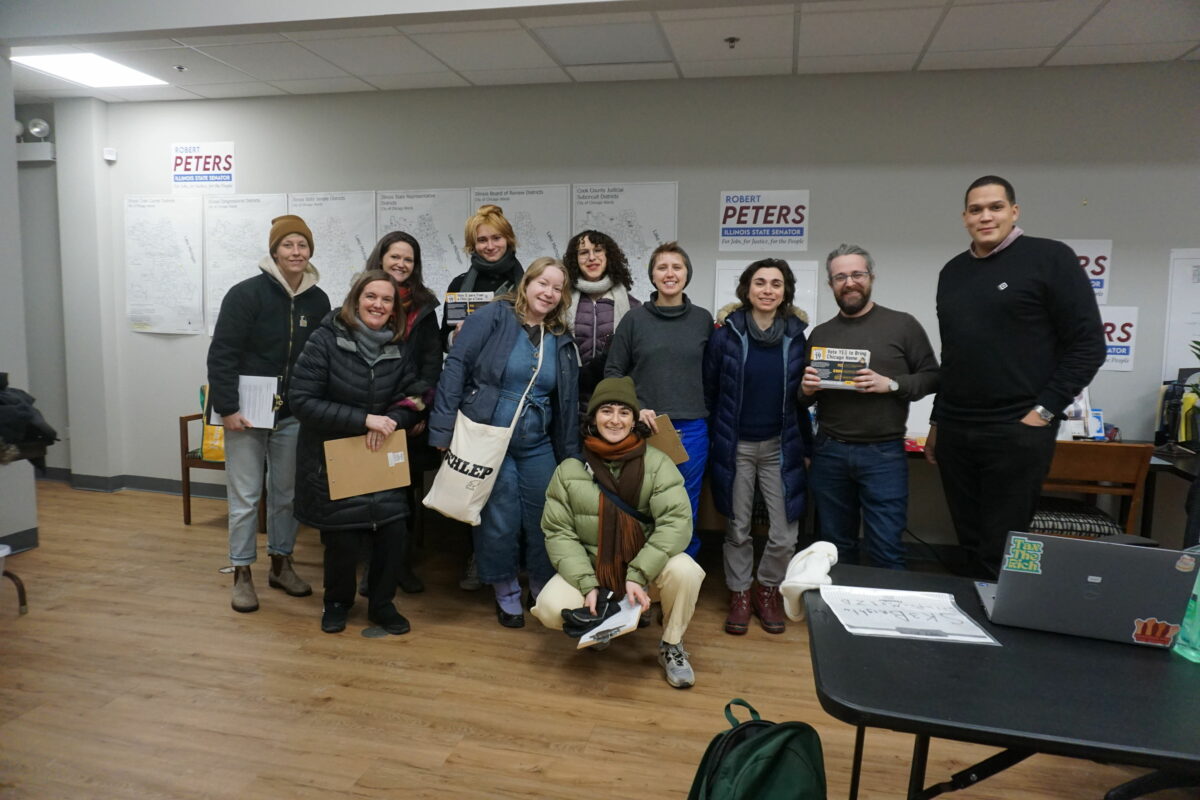On a chilly Sunday in January, a group of Hyde Park residents canvassed door-to-door to advocate for a March referendum that would reshape Chicago’s tax policy to address homelessness in the city.
About a dozen volunteers met at State Senator Robert Peters’s office at 47th and Lake Park to spread the word about Bring Chicago Home, a ballot referendum Chicago voters will decide on in the March 19 primary. The referendum seeks to establish a dedicated funding stream to provide services for people experiencing homelessness. Armed with hot chocolate and hand warmers, the group navigated icy roads and sidewalks to tell neighbors about the proposal.
“I’m just honored to open up the space to everybody here,” Peters told the volunteers before they were dispatched. “Being able to be at a place where we can foster that [organizing] work is something that warms me up.”
The event was among the latest mobilization efforts advocating for the passage of Bring Chicago Home. The initiative introduces a three-tiered progressive system for real estate property transactions. Sales under $1 million would see a reduced tax rate from 0.75 percent to 0.60 percent. Transactions exceeding $1 million but falling below $1.5 million would incur a two percent tax applied only to the value exceeding $1 million, more than 2.5 times the current rate. For sales of $1.5 million and above, the tax rate on the value over $1.5 million would be three percent, quadrupling the existing rate. According to the campaign, this tax increase will apply to about 4.2 percent of properties sold every year.
The revised tax structure, if approved, is projected to generate $100 million per year, according to the Chicago Coalition for the Homeless, which is spearheading the initiative. The revenue will be earmarked to build and maintain permanent affordable housing, along with the provision of services for an unsheltered population estimated to be about 68,000 people. A committee of service providers, subject matter experts, elected officials, and people impacted by homelessness will determine the fund’s allocation, added Jose Sanchez, the Coalition’s communications director.
“The initiative will not increase rent prices or make home purchases more expensive,” Sanchez said. “We’re moving forward on educating thousands of voters every weekend about why they should vote yes.”

Various progressive groups have worked on the Bring Chicago Home’ campaign since its launch in 2018. Currently, the organizing coalition includes Communities United, the Jewish Council on Urban Affairs, ONE Northside, SEIU Healthcare, and United Working Families. Former Mayor Lori Lightfoot blocked a City Council hearing on the proposal in 2019. Under Mayor Brandon Johnson’s administration, the City Council approved a binding referendum for the initiative in October, fulfilling one of Johnson’s key campaign promises.
Since the City Council vote to place the referendum on the ballot, a coalition of real estate and development groups, including the Building Owners and Managers Association of Chicago (BOMA), have swiftly mobilized to oppose it. On January 5, the coalition filed a lawsuit in the Cook County Circuit Court seeking to remove the referendum from the ballot. The coalition argues that by combining a tax hike for some with a tax cut for others, the proposal is an example of “log-rolling”—or bundling unpopular measures with popular legislation to secure passage—a practice deemed illegal by the Illinois Supreme Court.
A hearing is scheduled for February 14.
“Our lawsuit contends that the poorly written, multiple choice referendum question violates the Illinois Constitution, Illinois State Statute, and Illinois Supreme Court precedent,” wrote BOMA director of government and external affairs Amy Masters in an email to South Side Weekly. “Our goal is to remove this misleading question from the ballot.”
Peters, who has backed Bring Chicago Home since the campaign’s launch, has raised concerns about misinformation and says the opposition party is using their old playbook to forestall progressive reforms. When Gov. J.B. Pritzker introduced a constitutional amendment in 2019 to allow for a graduated-rate income tax, the Illinois Policy Institute, a conservative think tank, filed a lawsuit to block the ballot. A Cook County judge ruled against the group and let the ballot proceed, but Illinois voters eventually rejected the amendment in 2020.
“It’s important for us to continue to organize and push back against false information,” Peters said. “We are facing a heavily funded right-wing operation.”
Opinions and predictions on the economic consequences of the transfer tax increase are also divided.
Masters says that the transfer tax increase on high-end properties would eventually hurt average citizens because investors would be incentivized to move to other cities, taking away their jobs and reducing the tax base.
Real estate leaders have also warned that raising the transfer tax could exacerbate the office vacancy rate, which has not fully recovered from the pandemic. The city experienced a record-high office vacancy rate in the fall of 2023, according to Crain’s. In an opinion piece for Crain’s, CEO of Chicago Association of REALTORS® Michelle Mills Clement and CEO of Illinois REALTORS® Jeff Baker argued that the proposal would throw the city into an “urban doom loop,” prompting property owners to abandon investments and “turn the keys over” to banks.
Chicago currently has the second-highest commercial real estate property taxes in the nation, according to a 2023 study by the Lincoln Institute of Land Policy and Minnesota Center for Fiscal Excellence.
Other major cities have adopted similar approaches to generate dedicated funding addressing homelessness. In 2022, Los Angeles voters approved a “mansion tax” that imposes a four percent tax on property sales over $5 million and a 5.5% tax on sales over $10 million to fund affordable housing. A real estate group declared the tax hike unconstitutional and took it to court, but the case was dismissed and the tax prevailed in 2023. New York has imposed a similar tax on upscale real estate since 1989.
Christopher Berry, a professor at the University of Chicago’s Harris School of Public Policy, told Axios that the tax on high-end properties in New York did not deter real estate investment. “I don’t think anyone looks at New York’s market and says ‘you can’t sell a property for a million dollars anymore in New York,’” Berry said. In Los Angeles, several reports show that sales of luxury real estate dwindled in 2023 following the tax hike, but it remains unclear whether it will have a long-term impact on the upscale housing market.
Peters said he believes that this proposal will only make Chicago a more attractive city by showing its willingness to care for the vulnerable. “By investing in everybody in Chicago, even the most vulnerable, you’re only making Chicago better,” he said.
Amanda Ruch, a CPS middle school teacher who volunteered at Sunday’s canvassing event, said she learned about the Bring Chicago Home campaign through the Chicago Teachers Union. She added that her experience teaching students with precarious living conditions motivated her to participate in the door-knocking efforts.
“The weather is uncomfortable, but it makes the issue even more critical because there are people who are experiencing these conditions without a warm home to go home to or are in and out of shelters,” Ruch said. She added that most people she talked to hadn’t heard of the ordinance yet, but were receptive to the idea.
Sanchez said that thousands of volunteers have been canvassing neighborhoods, making phone calls, and sending text messages every weekend across the city to promote Bring Chicago Home since the canvassing initiative kicked off in December. The campaign remains actively recruiting volunteers through their social media channels.
“We are not taking anything for granted,” Sanchez said. “We want to make sure that people know this initiative, and we want them to understand the question on the ballot is really simple, which is to create a revenue stream to support homeless people.”
As Ruch continued her door-knocking for the day, she was energized. “I can deal with a couple hours of cold walking around to hopefully be part of getting this passed and decreasing the homeless population in Chicago,” she said.
Xuandi Wang is a journalist and policy researcher whose writing has appeared in Block Club, the Reader, In These Times, and elsewhere.



